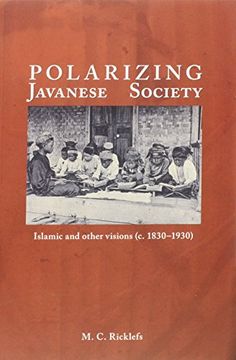Share
Polarizing Javanese Society: Islamic and Other Visions (c. 1830-1930) (in English)
M. C. Ricklefs (Author)
·
Univ Of Hawaii Pr
· Paperback
Polarizing Javanese Society: Islamic and Other Visions (c. 1830-1930) (in English) - M. C. Ricklefs
$ 3.98
$ 4.98
You save: $ 1.00
Choose the list to add your product or create one New List
✓ Product added successfully to the Wishlist.
Go to My WishlistsIt will be shipped from our warehouse between
Monday, July 08 and
Wednesday, July 10.
You will receive it anywhere in United States between 1 and 3 business days after shipment.
Synopsis "Polarizing Javanese Society: Islamic and Other Visions (c. 1830-1930) (in English)"
"Ricklefs grounds his study of Javanese religious change in the material reality of the island. This is very fine social history." ―James Rush, Arizona State UniversityBy the early nineteenth century, Islam had come to be the religious element in Javanese identity. But it was a particular kind of Islam, here called the "mystic synthesis." This Javanese mysticism had three notable characteristics: Javanese held firmly to their identity as Muslims, they carried out the basic ritual obligations of the faith, but they also accepted the reality of local spiritual forces.In the course of the nineteenth century, colonial rule, population pressure and Islamic reform all acted to undermine this "mystic synthesis." Pious Muslims became divided amongst adherents of that synthesis, reformers who demanded a more orthoprax way of life, reforming Sufis and those who believed in messianic ideas. A new category of Javanese emerged, people who resisted Islamic reform and began to attenuate their Islamic identity. This group became known as abangan, nominal Muslims, and they constituted a majority of the population. For the first time, a minority of Javanese converted to Christianity. The priyayi elite, Java’s aristocracy, meanwhile embraced the forms of modernity represented by their European rulers and the wider advances of modern scientific learning. Some even came to regard the original conversion of the Javanese to Islam as a civilizational mistake, and within this element explicitly anti-Islamic sentiments began to appear.In the early twentieth century these categories became politicized in the context of Indonesia’s nascent anti-colonial movements. Thus were born contending political identities that lay behind much of the conflict and bloodshed of twentieth-century Indonesia.
- 0% (0)
- 0% (0)
- 0% (0)
- 0% (0)
- 0% (0)
All books in our catalog are Original.
The book is written in English.
The binding of this edition is Paperback.
✓ Producto agregado correctamente al carro, Ir a Pagar.

